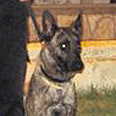
Several months ago, the unit received new dogs to help search for missing people in times of disaster. The dogs, who arrived from Holland for more than $10,000, began intensive training for rescue work upon landing in Israel.
One of them, named Oman, was trained to work with haredi volunteers.
"When the dog understands the most convenient language for his trainer, it creates a great amount of affection between them," explains Yekutiel Ben-Yaakov, the program's coordinator and dog trainers' recruiter.
He says there is another advantage in cases of disasters, earthquakes and searching for missing people in the haredi community, as the dog can understand calls for help in Yiddish and help locate the victim.
"In order to make the dog more accessible to the haredi sector, we trained him to act differently than fellow dogs. While most dogs bark when they locate the missing person, Oman doesn't bark or run wild so as not to pressure the trapped person, but just lies down on the floor."
This isn't the only advantage the Yiddish training has to offer. Unit officials explain that because the dog will be receiving orders in an unfamiliar language, undesired elements will not be able to disrupt the connection he has with his trainer or give him contradicting orders.
Dog trainers from Holland, who were brought to Israel to train Oman, guided the volunteers on the required rules of behavior.
Maale Adumim Fire Chief Momi Lubiner, the national rescue officer, says the unit is prepared for all types of rescue.
"The unit was required due to the field conditions in Judea and Samaria, characterized by mountainous and rocky areas," he explains. "As far as I'm concerned, they are ready to be sent out on a mission if an event takes place.
"The volunteers and their dogs have reached a high level of preparedness and we continue to train and prepare for any incident."















